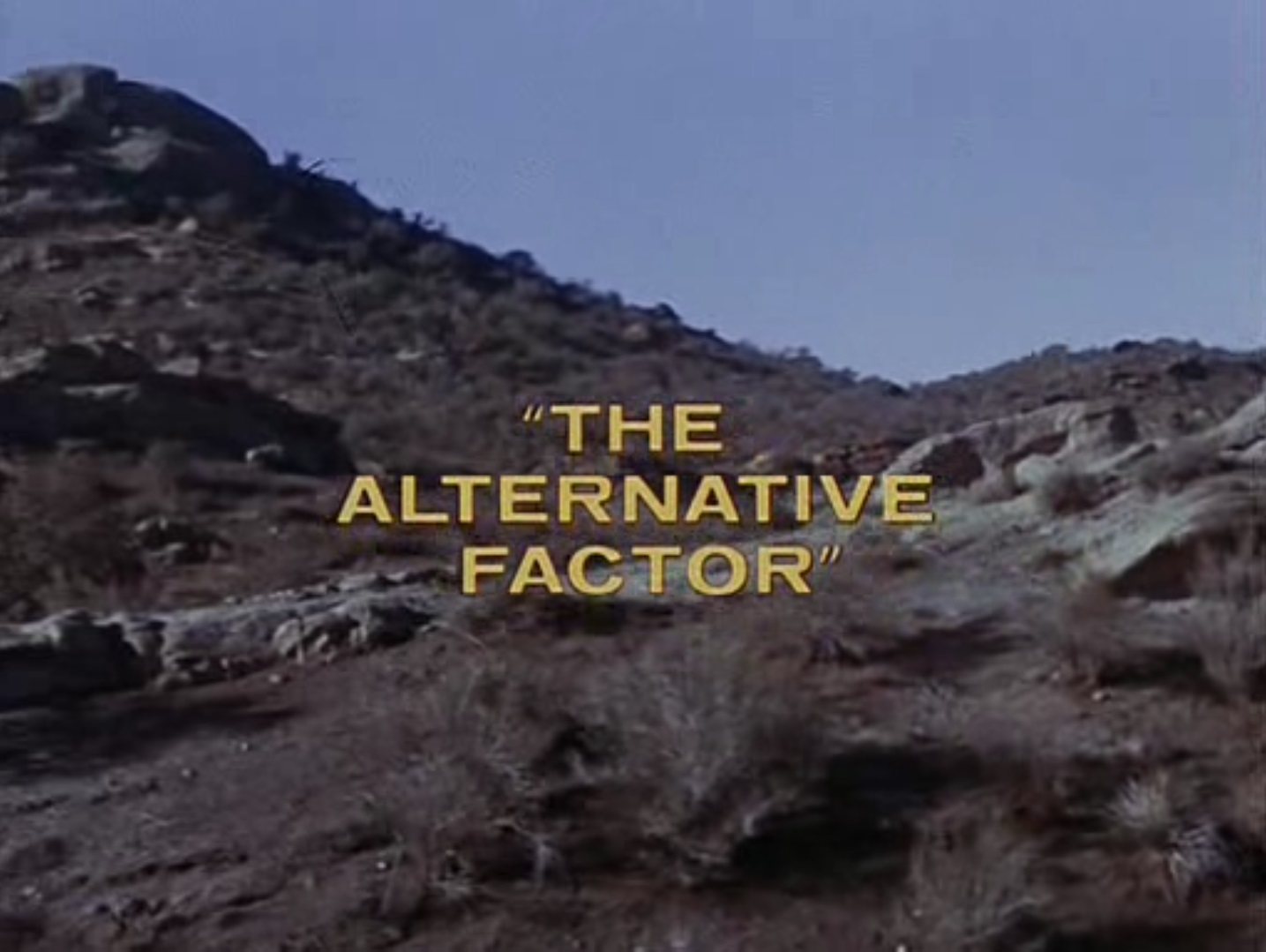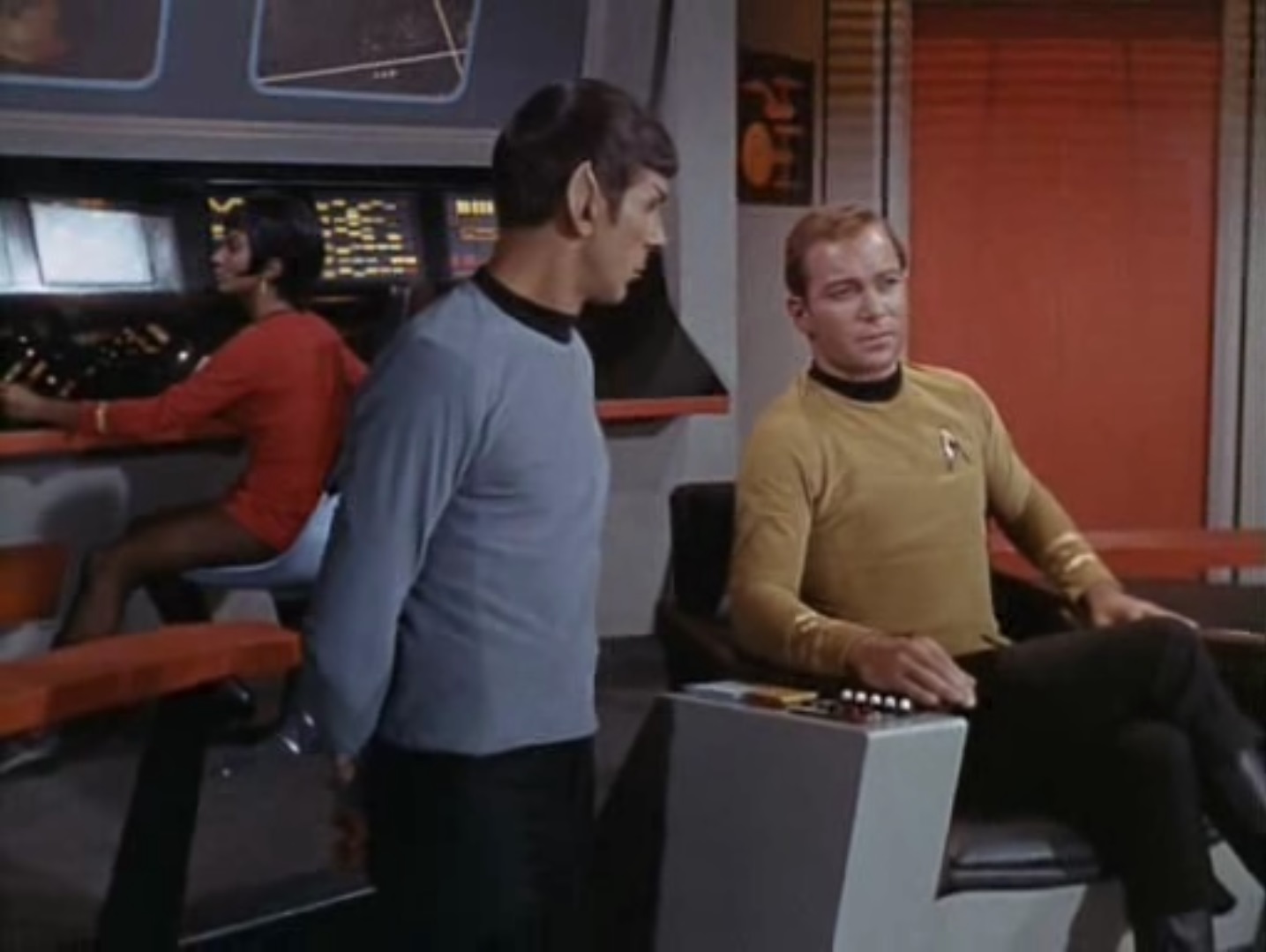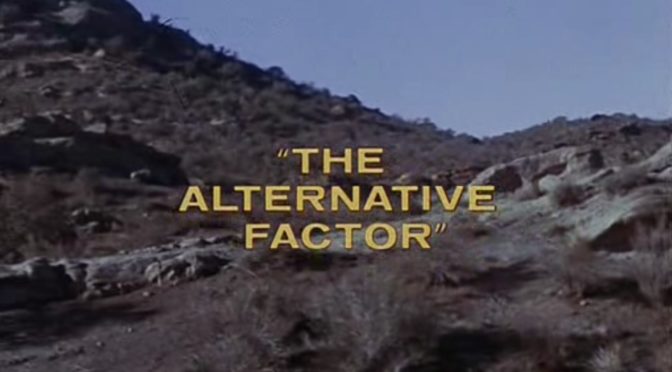
by Janice L. Newman
Star Trek has given us some of the best science fiction on television. It’s also, like any weekly show with scripts written by different authors, had some mediocre episodes. But watching with a large group every week, we’ve found that even episodes that had many detractors still had at least a few fans among us.
Until now.

“The Alternative Factor” started strong, with an unexplained phenomenon causing everything in the universe to briefly ‘wink out’. There are several tense exchanges between Captain Kirk and Mr. Spock, and then one between the captain and “Starfleet Command” (though without the delay which one would expect at such a distance). These exchanges set the stage for a fascinating mystery.

"We've got word that this episode is a stinker, Captain. You're on your own."
Unfortunately, from that point on, the episode degenerates into an inconsistent, near-nonsensical mess.
During the phenomenon, a person appears on the previously barren planet below. The captain orders the being beamed aboard the ship. The being is unsubtly named “Lazarus”, though we never actually see him give his name, only hear Captain Kirk call him by it later in the episode. Lazarus behaves strangely, begging for help in destroying ‘a monster’. He’s then apparently given the run of the ship, despite the fact that they are at battlestations.

"Say, the coffee's pretty good in this place!"
What follows feels more like a French bedroom farce than an episode of Star Trek. When the phenomenon occurs, we see two inverse silhouettes fighting, and Lazarus is replaced by a different Lazarus, though this is so poorly conveyed that eventually Kirk and Spock must have a conversation heavy with explanation (that lasts five minutes!) in order to tell the audience what’s supposed to be going on. One of the versions of Lazarus is supposedly mild and calm, but the vast majority of the time Lazarus has interacted with the crew he’s been an eye-rolling, scene-chewing maniac. The differentiation of ‘good Kirk’ and ‘evil Kirk’ in “The Enemy Within” was so well done that the clumsily handling here is doubly offensive.

"Bad" Lazarus choking on a piece of scenery
The fact that Lazarus is allowed to roam free to wreak havoc is consistent with previous episodes of Star Trek (see: “Charlie X”, for example) but even after he’s under suspicion of having stolen critical dilithium crystals, he still easily slips through security’s incompetent fingers (when they bother to put a security guard on him at all).
Eventually, Kirk ends up going through a ‘corridor’ between universes and encounters the rational version of Lazarus, who explains that everything the other Lazarus has said—the claims that his civilization was destroyed, that he’s a time traveler, that the rational Lazarus is a monster in human form—are all nothing more than the ravings of a madman. The insane Lazarus is prepared to meet and fight his antimatter counterpart even if it means destroying both universes.
The rational Lazarus outlines a plan where he will trap the other Lazarus in the corridor between their universes and, with Captain Kirk’s help, destroy the ships which act as the doors at either end of the corridor. Though he himself will be trapped for eternity fighting himself, the universes will survive. Captain Kirk helps him implement the plan, mournfully says, “But what of Lazarus…and what of Lazarus?” (a line they liked so much they used it twice) and the episode is, thankfully, over.

"But what of…" "Yes, Jim. We get it."
What was particularly frustrating about this episode is that there were plenty of ways to make it more coherent and less nonsensical. Instead of having the ship’s crew behave utterly incompetently, Lazarus could have changed locations whenever the phenomenon occurred, allowing him to slip through their fingers without making them seem like buffoons incapable of basic reasoning. Instead of Kirk going along with the plan outlined by the rational Lazarus, he could have attempted to stun the insane Lazarus, and had him escape anyway. Throughout the story ideas are thrown in that seem to come from nowhere, for example, when the sane Lazarus states that destroying the other ship will also destroy his own, it’s the first the audience has heard of such a connection. The ending is poignant, but could have been so much more so if the story had made more sense. The worst thing a show can do is make you ask, “But why didn’t he…? Why didn’t they…?” and I found myself continually plagued by this damming question throughout the episode.
Better editing, more careful writing, and thoughtful direction could have made this story one of the classics. Instead, it’s the worst episode of Star Trek we’ve seen thus far.
One Star.
Bad Comedy

by Joe Reid
Dear Reader, I’d like to preface my thoughts on this weeks’ episode of Star Trek with a number of more pleasurable thoughts. First being that the month of March just ended and almost everywhere in this wonderful country we live in the weather is beautiful. Nature is on full display. Jack MacMahon was just appointed the General Manager of the San Diego Rockets. That’s good news to local basketball fans. Lastly April Fools Day came a couple days early courtesy of Mr. Gene Roddenbury.
My first exclamation of disbelief was provoked very early in the show. The crew was going about what appeared to be routine business. They were exploring a mundane new world, with no life, and no civilization; then the makers of the show boldly went to a place of utter confusion. I said “you have got to be kidding me”, as a red space cloud was layered over the screen in a strange thrusting motion. It had to be the most meaningless moment of television that I have witnessed in a long time. The cheesy effect lacked meaning until characters explained to the audience what it was. At that point it went from being meaningless to ridiculous, but let’s continue.

Trek optical team's finest hour
The second time this airing caused me to question my TV set was not much later in the episode. It just so happened that the red space cloud effect caused life to appear on the dead new world the crew was in the process of scanning. The captain decided that it would be a smart idea to visit the planet HIMSELF and say hi to the new life form. This life form turned out to be a severely accident-prone, waif-bearded swooner named Lazarus, played by Robert Brown. The first thing this biblically named beatnik does is jump off a rock to apparent death. If only we were so lucky as to have lost this troublesome character at his first “death” we could have been spared witnessing the unfocused, angry, conniving, and as I previously mentioned swooning performance that Brown brought to us. The rest of the mainstays were no better. Kirk, Spock, and McCoy took every opportunity to provide Lazarus with unguarded access to anything that he wanted. Which forced me to say, “you have got to be kidding me. They can’t be that dumb”.

"Good thing they didn't think to keep me locked up!"
It would be my earnest desire to say that there was only one more instance of low points of the bad joke that this episode was for me. But like his namesake in the Good Book, Lazarus kept coming back to Life and causing more trouble for the crew of the Enterprise, and they deserved every bit of it for all of the dumb choices the characters in the episode make. Even up until the last scene, with an unsatisfying twist ending, this episode was a painful stinker of a show.
This episode deserves to receive the lowest rating that I can give, and I would if not for a standout performance by the lovely Janet McLachlan, who played Lt. Charlene Masters. Her performance was real and grounded, making up for the abysmal performances that surrounded her in this episode.
2 stars

by Gideon Marcus
I think I understand what happened last week. There are obviously two "Alternative Factors" – one matter, one…doesn't matter.
We didn't get the good one.
In another universe, Roddenberry produced a coherent episode, one in which we actually saw the sane Lazarus on the Enterprise and could distinguish him from "crazy Lazarus with Band-Aid", one in which "engineering" actually looked like the engineering sets we've seen before, one in which a better special effect was employed than superimposing the Triffid Nebula over the screen followed by the "EXTRA! EXTRA!" newspaper effect.
In the alternate Alternative Factor, the bugaboo wasn't antimatter, which every Starship in Starfleet utilizes safely in its warp engines. In that episode, there was an explanation for why Lazarus needed dilithium crystals (after all, it's not as if they were necessary to swap universes). In another reality, there was an explanation why destroying one of the Lazarus ships destroyed the other.
In that alter-episode, it is addressed that one can't actually wrestle another person, even an identical person, for an eternity. Someone is going to get hungry.
On the other hand, perhaps in this posited installment ("The Other Element", perhaps it's called?) we might not have gotten Lieutenant Charlene Masters, who was a welcome addition to the crew, very Cicely Tyson-esque.

Even the redoubtable Lieutenant Masters couldn't save our version of the episode.
Nevertheless, she's still not enough to pull the episode above a dismal 1.5 stars.
(credit to Tam Phan for the idea for this piece)
Next week's episode promises to be better. Come join us tonight at 8:00 PM (Eastern and Pacific). We'll be reading a fanzine, too.
Here's the invitation!




That "red space cloud" is Messier 20, aka the Triffid Nebula. No this is not where the triffids come from, or so I think. M20 does produce stars, however.
I agree with all concerned that TAF was muddled at best. I feel like whoever wrote this episode was not into Star Trek and certainly not into any real physics or science, or couldn't be bothered to look anything up.
So now dilithium crystals are flat?
I hope they will have more of Lt. Masters on the series. I mean, this is the series that is breaking the diversity barriers, after all.
One pound of matter connecting with one pound of antimatter equals an energy release of 43 Hiroshima atomic bombs. Now that would be a pretty powerful blast, but hardly enough to destroy the Universe. So even two full grown men from those alternate worlds encountering each other would not produce an explosion big enough to destroy a single world, let alone the Cosmos.
BTW, how do we know there is only one of those "time "(?) machines? What is more versions of Lazarus or other beings altogether built such devices and tried to cross between worlds? That we will probably never see such a thing again can bring us some comfort, along with the fact that you would need a LOT of antimatter encountering a LOT of matter to make a level of destruction worth worrying about on an interstellar scale.
All fine points!
Thank you! I would like to add that Dale Nelson in this comments thread added a few… alternative factors… on this episode that made me look at it in a different way, which is always appreciated.
However, I still think overall it was a poorly written episode that lacked much in the way of understanding physics, general science, and the series characters and their society.
What a truly awful hour of television. On top of everything else, there's the matter that the dilithium crystals seem to power the ship and then, when they run dry, you… recharge them? Along with ignoring common sense and even mediocre television writing, this episode violates the laws of thermodynamics.
The only bright spot was Lt. Masters. I hope we see a lot more of her.
I like this one and expect it to remain one for which I have fond thoughts however long Star Trek lasts.
It goes for the Sublime.
Often in Star Trek there's a modest element of mystery, in the sense of puzzles that can be resolved when more facts are known. That's the usual sense of the word "mystery," as in "mystery stories." Once you know the secret of Balok, for example, in "The Corbomite Maneuver," the mystery is solved and the crisis connected with him is over. In Greek terms, it's a comedy. That was a good story, but it wasn't a very haunting one. Nor is the usual Star Trek story, which is fine.
But there's another sense of the word "mystery," which has a root in religion. Here a "mystery" is something that can't be "solved" and so have its strangeness or greatness dispelled. It may be -contemplated- (as Kirk is doing in the last line), but it involves something larger than oneself, larger than one's routine categories of thought. This Star Trek teleplay probably brings us closer to -that- concept of mystery than any of the ones we've seen so far. We're not only confronted by something we don't understand — even at the end we don't fully understand it. Probably we can't understand it. At least that's how it strikes me.
The special effects are obviously "inadequate," and paradoxically I think that may be a plus: obviously they can only point to something really beyond comprehension. Similarly the name "Lazarus" is actually a good choice, not in a literal sense but because it suggests a person who has gone beyond a fundamental boundary and then returned. (Incidentally for Eastern Orthodox Christians the Saturday before Palm Sunday is Lazarus Saturday.) The special effects -obviously- only -suggest- something tremendous and baffling, in the same way that language of a "corridor" obviously can only point to something finally incomprehensible or, in the term of Rudolf Otto, "numinous."
I think too that the mad Lazarus troubles us, especially if we have any affinity with Orthodox Christianity, in that we have to wonder if he is simply a nutter or if he is touched by tremendous mysteries that elude us, we who happily bop along in the quotidian. I don't suppose that anyone involved in the production of this teleplay actually thought of this, but the mad Lazarus reminds me of the figure from Greek and Russian Orthodoxy of the yurodivye, the holy fool. These were figures who could be psychotic vagrants; or impostors who cadged a living by falsely performing according to a recognized social role but from merely self-serving ends; …or people (men or women) actually in touch with the divine. These last were, if you will, apocalyptic figures — apt to unsettle normal people, particularly the people possessing authority and wealth, because the holy fools erupt onto the scene and throw things off balance — as Star Trek's Lazarus surely does.
Of course it turns out that the mad Lazarus is, indeed, basically a nutter with a persecution mania. Well, but how did he get that way? Perhaps we can only speculate.
It's easy, and appropriate, to point out flaws in this teleplay, but I give it a lot of credit for being, let's say, that rare thing, 50 minutes' TV entertainment that gives, or may give, a lot more than the viewers bargained for, and perhaps suggests that there's more out there that we account for by our philosophies. I'm willing to give it 4/5.
I think you saw "The Other Element", which was probably an excellent show. Or you have the divine ability to see into other universes.
Either way, your letter is several times more enjoyable than the episode!
Another thing "The Alternative Factor" has going for it, for me, which I should confess, perhaps, since I have an eccentrically high opinion of this one, is the location photography at Vasquez Rocks, seen earlier in another favorite, "Arena," and in one of my favorite TV efforts, the "Zanti Misfits" teleplay on The Outer Limits. I still remember the eerie bit in the preview for that one, in which a nogood and his unhappy ladyfriend drive into an off-limits area where, unbeknownst to them, a spacecraft from another planet is about to land. We see the cloudy sky above the Rocks and then appears the alien vessel descending. I didn't actually think of that -as- I was watching "The Alternative Factor"; but it might be that my memory of the OL show was influencing my feelings about this Star Trek. But that factor aside, I still think it's a pretty good effort anyway, one of the best so far.
Wow, that's some deep analysis there!
For whatever it might be worth, from time to time my better half or I will say "But what of Lazarus?" at random. Something about Kirk's extreme seriousness as he delivers that line amuses us.
Thank you very much for including pictures. That's my dad playing 3-level chess. He's been gone for many years and I've been searching the internet for pictures of him.